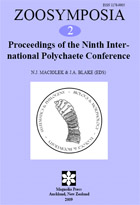Abstract
This paper provides a morphological description of Capitella teleta sp. nov., an opportunistic capitellid that is also commonly used as an experimental polychaete under the provisional designation Capitella sp. I. The species is widely distributed along the east and west coasts of North America and also reported from Japan and the Mediterranean. The species belongs to a group having distinct sexual dimorphism, yet with hermaphrodites occurring under certain conditions. Morphologically, C. teleta has a long, narrow body, with all thoracic segments similar except for sexual modifications on setigers 8–9; the prostomium/peristomium combined are long, narrow and about 2.5 times as long as setiger 1. Capillary setae are present in noto- and neuropodia of setigers 1–7; setigers 8–9 have hooded hooks in noto- and neuropodia of females; genital spines replace notopodial hooks in males. A methyl green staining pattern is limited to some thoracic setigers of females; males lack a distinct staining pattern. The cytochrome oxidase I (COI) sequence is presented. Relationships of C. teleta with the type-species, C. capitata and other known species including siblings identified in laboratory culture are discussed. The syntype of Ancistria acuta Verrill, 1874, the only known species of Capitella described from New England was examined and determined to be incertae sedis. C. teleta is a highly opportunistic species and appears to be the same as the C. capitata identified from southern California as the “polluted zone indicator” by D.J. Reish in the late 1950s. An appendix with over 200 published references to research conducted on C. teleta is included.

